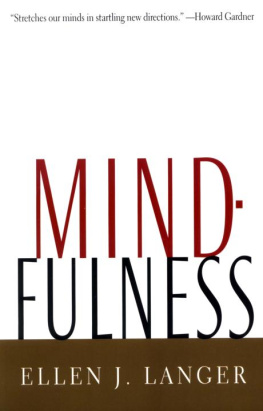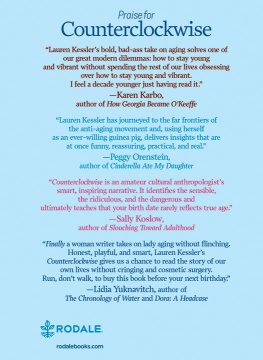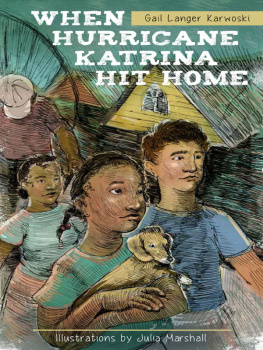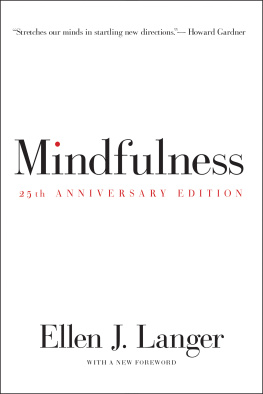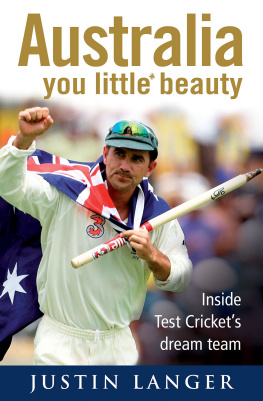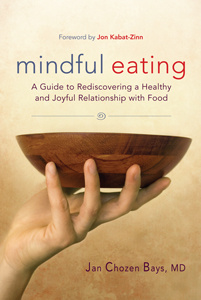Advance praise for Counterclockwise
Counterclockwise presents a new way to think about lifelong health and aging. Read this most important book to improve your quality of life at any age.
D EEPAK C HOPRA , M.D.
Counterclockwise is a gema book that is equally practical and philosophical without seeming to be either, and one that makes you feel bettermore conscious and more preparedabout growing old, even if you werent feeling bad about it in the first place. There is no one thinking more creatively about sickness and health than Ellen Langer, and she shares what she knows here with uncommon felicity.
S UE H ALPERN , author of Cant Remember What I Forgot: The Good News from the Frontlines of Memory Research
Take a brilliant, creative social scientist, without any respect for conventional wisdom and you get Ellen Langer. She is a fantastic storyteller, and Counterclockwise is a fascinating story about the unexpected ways in which our minds and bodies are connected. More important, Counterclockwise shows how a better understanding of this relationship can lead to a better life.
D AN A RIELY , P H. D., author of Predictably Irrational: The Hidden Forces That Shape Our Decisions
Ellen Langers work has been an inspiration to me for years. Counterclockwise, her latest book, will change the way you think about your healthfor the better. Its simply fabulous.
C HRISTIANE N ORTHRUP , M.D., author of The Wisdom of Menopause and The Secret Pleasures of Menopause
Awareness-mindfulness is the first step in healing. In Counterclockwise, Dr. Ellen Langer eloquently describes how becoming more aware of our beliefs and expectations allows us to powerfully transform our lives for the better. A pioneering, beautifully written book.
D EAN O RNISH , M.D., founder and president, Preventive Medicine Research Institute; clinical professor of medicine, University of California, San Francisco; and author of The Spectrum
Counterclockwise makes a strong case for the influence of expectation and belief on how our bodies function, on how we heal, and even how we age. Ellen Langer presents fascinating scientific data to support this view and argues convincingly that we should learn to take greater control of our health through the practice of mindfulness. Her research is innovative and empowering.
A NDREW W EIL , M.D.
Ellen Langer offers us brilliant insights into subtleties that hold us back in life and shows the way to shining new possibilities. Counterclockwise will change the way you see and think.
D ANIEL G OLEMAN , P H. D., author Emotional Intelligence
Dr. Langers work provides fascinating insight into the body-mind connection. She shows how changing our minds changes our bodies to optimize our health and performance as we get older.
J ILL B OLTE T AYLOR , P H. D., author of My Stroke of Insight
Ellen Langer has used her extensive research and scholarship to write a book that will be indispensable to anyone confronting illness or old age (in other words, to everyone). She shows that many seemingly unavoidable damages to our body can be reversed or ameliorated by the conscious application of the mind. The book can be used as a manual against despair, but more than that, it is a seminal work in what the author calls the psychology of possibilitya perspective on the unexplored riches of human nature.
M IHALY C SIDAZENTMIHALYI , P H. D., author of Flow: The Psychology of Optimal Experience
ALSO BY ELLEN J. LANGER
Mindfulness
The Power of Mindful Learning
On Becoming an Artist
For Norman LangerGive my regards to Broadway.
CONTENTS
CHAPTER 1
CHAPTER 2
CHAPTER 3
CHAPTER 4
CHAPTER 5
CHAPTER 6
CHAPTER 7
CHAPTER 8
CHAPTER 9
CHAPTER 10
Authors Note
This book could be read as anti-established medicine. It is therefore important to state that if I personally were to experience extreme health symptoms, I would go to my doctor, but there is little else I would do that is traditional.
CHAPTER 1
Counterclockwise
What we need is not the will to believe, but the wish to find out.
William Wordsworth
T heres no way to turn back the clock or to fight the inevitable. We age and the vigor of youth becomes only a memory as we are ravaged by time. Chronic illnesses take their toll, our health and strength diminish accordingly, and the best we can do is graciously accept our fate. Once sickness is upon us, we give ourselves over to modern medicine and hope for the best. We cant intervene as time marches on. Or can we?
In the 1970s my colleague Judith Rodin and I conducted an experiment with nursing home residents.receive visitors, and if and when to watch the movies that were shown at the home. Each also chose a houseplant to care for, and they were to decide where to place the plant in their room, as well as when and how much to water it. Our intent was to make the nursing home residents more mindful, to help them engage with the world and live their lives more fully.
A second, control group received no such instructions to make their own decisions; they were given houseplants but told that the nursing staff would care for them. A year and a half later, we found that members of the first group were more cheerful, active, and alert, based on a variety of tests we had administered both before and after the experiment. Allowing for the fact that they were all elderly and quite frail at the start, we were pleased that they were also much healthier: we were surprised, however, that less than half as many of the more engaged group had died than had those in the control group.
Over the next several years, I spent a lot of time thinking about what had happened. Our explanation was that the results were due to the power of making choices and the increased personal control it affords. Although we couldnt make an airtight case, subsequent research would bear out our original understanding. Our research had taken place at the beginning of what was later termed the New Age movement and well before mind/body studies were conducted in laboratories around the country. It raised a nagging question: What is the nature of the link from the nonmaterial mind to the material body? Examples of this connection are all around us. We see a rat and show signs of fear as our pulse races and sweat breaks out on our skin; we think about losing a significant other and our blood pressure increases; we watch someone vomit and we feel nauseous ourselves. While we easily see evidence of the connection, its not well understood. Even we had been surprised: it seemed odd that simply asking people to make choices would result in the power ful consequences that our study showed. Subsequently, I realized that making choices results in mindfulness, and perhaps our surprise was because of the mindlessness we shared with most of the culture. I began to realize that ideas about mind/body dualism were just that, ideas, and a different, nondualist view of the mind and the body could be more useful. If we put the mind and the body back together so that we are just one person again, then wherever we put the mind, we would also put the body. If the mind is in a truly healthy place, the body would be as welland so we could change our physical health by changing our minds.


